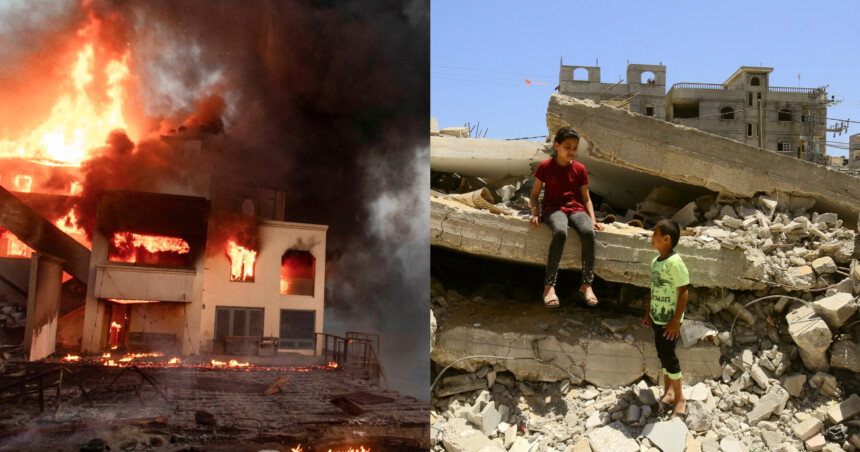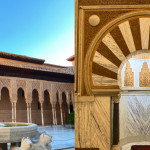The world’s empathy is not just misplaced — it’s brutally selective.
In Los Angeles, wildfires are still sweeping through affluent neighbourhoods, reducing luxury mansions and historic landmarks to smouldering ruins. [1]
The collective media has been responding with utmost sympathy, highlighting celebrity losses while insurance claims and GoFundMe campaigns promise assured recovery.
Meanwhile, Gaza has just endured a calculated genocide, obliterating entire families, erasing generations, and annihilating a nation. [2]
Survivors are sifting through endless rubble with no insurance, no real global sympathy, and no hope for rebuilding — a silence as deafening as the bombs that rained down on them since October 2023.
These parallel tragedies, one for those shielded by privilege, the other an unending nightmare for the forsaken, have clearly shown the hypocrisy in how grief is valued and whose humanity is deemed worthy of mourning!
Outpouring of sympathy for wealthy elite
The wildfires in Los Angeles have ravaged affluent areas such as the Pacific Palisades and Malibu, destroying properties with multi-million dollar price tags.
Media coverage has been saturated with stories of celebrity losses: Adam Brody and Leighton Meester’s $6.5m home gone; Anthony Hopkins losing two homes; and Paris Hilton lamenting the loss of her mansion.
While losing a home is undeniably traumatic, the reality for these celebrities is far removed from the existential crises facing millions worldwide.
These stars have safety nets — multiple properties and millions of dollars to start over. Barbara Corcoran’s destroyed Malibu home was accompanied by a fundraising campaign for her neighbours; how many in Gaza are afforded even that small gesture of support?
The media’s fixation on celebrity suffering reflects the disparity in how loss is reported and, more importantly, mourned.
Gaza is a graveyard of generations
While celebrities in Los Angeles deal with the loss of homes and heirlooms, Gaza had been burning under a much deadlier fire — a non-stop campaign of airstrikes and drone warfare: a systematic genocide.
Unlike the affluent homeowners of the Pacific Palisades, the people of Gaza have no insurance, no safety nets, and little hope for recovery.
Their homes were not just structures but lifelines, sheltering families that spanned generations. When they were destroyed, they took with them more than possessions — they erased the existence of entire generations.
Devastation in Gaza is staggering
- Housing destruction: over 350,000 houses and housing units have been destroyed or damaged.
- Timeframe: it is estimated that reconstructing Gaza’s homes will stretch to 80 years under existing conditions.
- Casualties: between October 2023 and June 2024, there were 64,260 deaths, with women, children, and the elderly making up nearly 60 per cent of the deaths for which demographic details are available. [3]
- Reconstruction costs: in May 2024, the total cost of rebuilding Gaza was estimated at $40-50bn, with $2-3bn needed for an early recovery programme to provide temporary shelters and basic community support. This will have increased many times since then. [4]
The crimes against humanity have not only devastated Gaza’s infrastructure. They have also set its development back by 40 years, wiping out nearly $50bn in progress.
This regression to 1980s levels means education, literacy, and access to healthcare are dramatically impacted.
Basic services such as water, sanitation, and electricity are scarce, exacerbating the suffering of a population where over 60 per cent now live below the poverty line.
Let us consider the environmental parallels
Both LA and Gaza have been compared to apocalyptic wastelands, their skies choked with smoke and ash. Yet the causes of their devastation differ in origin and intent.
In Los Angeles, events have been amplified by climate change
Wildfires in LA are a tragic but predictable result of decades of climate neglect.
Rising temperatures, prolonged droughts, and unsustainable urban sprawl have turned California into a tinderbox.
The destruction of these fires is painful to see, but it is a consequence of humanity’s failure to address climate change.
Whereas with Gaza, it is destruction by design
In Gaza, the devastation is deliberate.
The systematic bombing of civilian infrastructure, including homes, schools, hospitals, and water treatment plants, was not a natural disaster but a political and military choice.
It is state-sanctioned violence aimed at erasing a people, with long-term environmental consequences. Bombing campaigns released toxic chemicals into the air, polluted groundwater, and destroyed fertile land, creating a man-made ecological collapse.
The key difference lies in the response: while the world rallies to support LA with donations, rebuilding efforts, and insurance claims, for over 15 months Gaza’s cries for help were met with silence and complicity.
Media coverage is from the privilege of grief
The sheer contrast in how these tragedies are reported reflects a troubling bias in media narratives.
Headlines about LA fires have focused on the personal losses of the wealthy and famous, humanising them in a way that Gaza’s victims rarely are.
Names like Eugene Levy and Paris Hilton evoke sympathy, while the nameless, faceless masses of Gaza are reduced to statistics.
Detailed accounts of celebrity losses include phrases like, “We will rise again” and “Where’s the justice?” Yet when it comes to Gaza, these sentiments are absent.
The Palestinian people are painted as collateral damage, their suffering normalised in a way that would be unthinkable for residents of the Pacific Palisades.
And Gaza’s victims are rarely afforded the dignity of individual stories. Instead of focusing on the mothers clutching the bodies of their children or the elderly digging through rubble for keepsakes, coverage often reduces them to political pawns.
This dehumanisation is perpetuating global indifference, allowing the broader Palestinian genocide to continue unchecked.
Conclusion
The outpouring of grief for LA’s celebrity losses is understandable, but there’s a clear and present duplicity there. It cannot and must not overshadow the far greater tragedies unfolding elsewhere.
Gaza’s people deserve the same empathy, support, and outcry as people in the Pacific Palisades.
Until we learn to value all lives equally — regardless of wealth, fame, or geography — the world will continue to burn, both literally and figuratively.
Islamic governance
The fires consuming our planet — whether the wildfires of climate collapse or the flames of oppression and genocide — can only be extinguished by a system rooted in Allah’s laws and justice.
By returning to Islamic governance, where policies are structured upon the divine wisdom of the Creator, humanity can implement systems that address the root causes of injustice, environmental degradation, and exploitation.
Such governance would emphasise justice, ensuring the fair distribution of resources and uplifting the oppressed. It would implement sustainable policies designed to respect the balance of nature, curbing exploitation and fostering environmental restoration.
Furthermore, Islamic governance integrates compassion and accountability, holding the powerful to account while prioritising the needs of the vulnerable. This holistic approach would offer a road-map to not only healing societal wounds but to building a world rooted in equity, sustainability, and spiritual alignment.
Without it, humanity will continue to spiral into chaos, inequality, and destruction. If we fail to embrace a system that values every life and prioritises justice for all, how much longer will Muslims and humanity continue to suffer under the weight of its own neglect?
The question is no longer just whether we will act, it is whether we will have the courage to return to the timeless wisdom of Allah’s plan and rebuild a world aligned with His vision for justice!
Or will we watch as both kinds of fires consume what’s left of our world?
Also read
- Reflections as my home burnt down
- Key lessons we can take from the LA fires
- Celebrating and commemorating the Gaza ceasefire
Source: Islam21c
Notes







